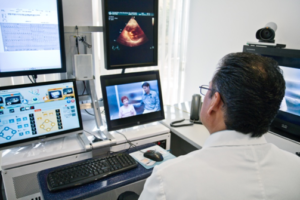The coronavirus pandemic has changed the world profoundly over the past few months. Globally, millions of people have contracted COVID-19 and hundreds of thousands have died [1]. Millions more have had their lives up-ended with jobs ending, schools closing, family separations, and varying degrees of quarantine. We face uncertainty daily: Did someone I pass at the grocery store have COVID? How much longer should I stay home? Fortunately, people have been taking precautions to keep themselves and others healthy: washing their hands, covering their mouths, and avoiding unnecessary exposures.
One exposure that I didn’t expect we would be able to avoid here in the US has been visits to the doctor’s office. However, given recent Centers for Medicare & Medicaid Services (CMS) temporary expansions, more people than ever are using tele-health. In March, there was a 50% increase in tele-health visits across the country [2]. This expansion into tele-health has been aided specifically by the recent CMS 1135 waiver that has increased access to and reimbursements for tele-health [3].
That said, I’m left wondering how tele-medicine will affect caring for patients with heart disease and other high-risk groups in the future. Will adherence improve without the hassles of having to drive to the office? Will tele-physical exams be accurate enough to confidently make medication changes? Only time will tell. Certainly something I’ll be looking out for.
 [4]
[4]
References:
- https://coronavirus.jhu.edu/
- https://www.cnbc.com/2020/04/03/telehealth-visits-could-top-1-billion-in-2020-amid-the-coronavirus-crisis.html
- https://www.cms.gov/newsroom/fact-sheets/medicare-telemedicine-health-care-provider-fact-sheet
- Author: Intel Free Press
- License: https://creativecommons.org/licenses/by-sa/2.0/legalcode
- No changes made.
“The views, opinions and positions expressed within this blog are those of the author(s) alone and do not represent those of the American Heart Association. The accuracy, completeness and validity of any statements made within this article are not guaranteed. We accept no liability for any errors, omissions or representations. The copyright of this content belongs to the author and any liability with regards to infringement of intellectual property rights remains with them. The Early Career Voice blog is not intended to provide medical advice or treatment. Only your healthcare provider can provide that. The American Heart Association recommends that you consult your healthcare provider regarding your personal health matters. If you think you are having a heart attack, stroke or another emergency, please call 911 immediately.”